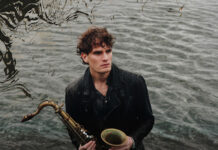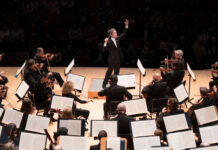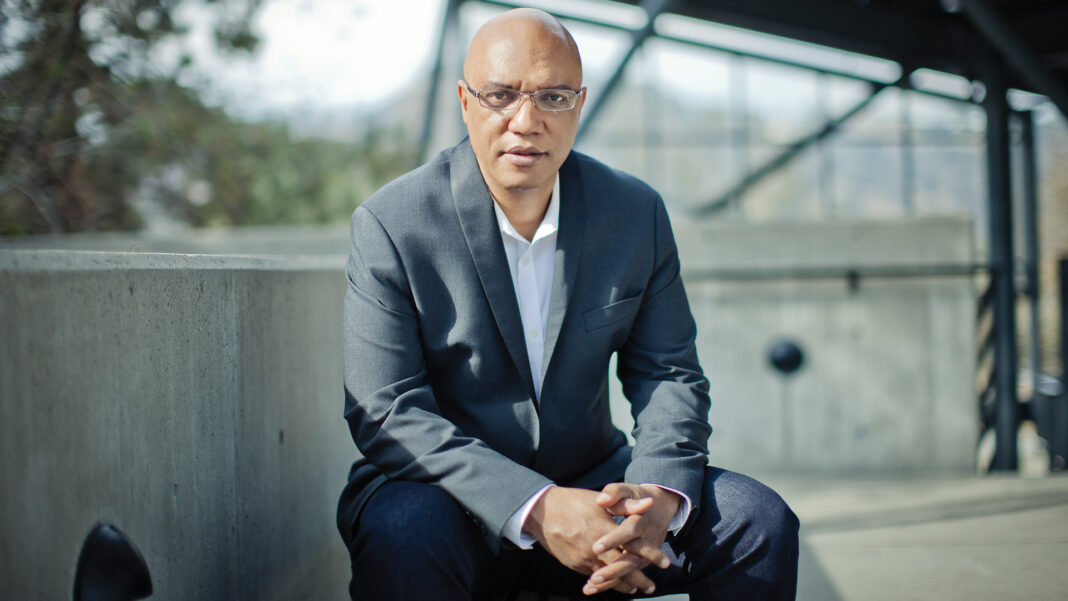In January of 2019, the Los Angeles Philharmonic held a concert called The Edge of Jazz. The idea was to explore worlds where jazz meets classical music and vice-versa. Amongst the composers and performers that evening were Vijay Iyer, Tyshawn Sorey, Kamasi Washington and Billy Childs.
Childs gave the world premiere performance of of Darkness and Light. Whether the evening fully answered the goal of finding where these genres of music overlapped, it did confirm that Childs is someone who successfully lives in both worlds.
On Thursday, October 14th, Childs and his Jazz Chamber Ensemble, will be headlining an Angel City Jazz Concert at The Ford in Los Angeles. Joining them on the bill are vocalists Dianne Reeves and Moira Smiley, Lyris Quartet and there will be poetry recited by Alexander Gedeon, who was named earlier this year as the Minister of Culture for Long Beach Opera.
Childs has received five Grammy Awards from amongst his 16 nominations. His most recent album was 2020’s Acceptance. His work also appears on Inna Faliks’ new album Reimagine: Beethoven & Ravel. In short, he’s one of the most in-demand and prolific artists of our time.
Yesterday I spoke by phone with Childs about his music, what he wants to say with it and the important role audiences play in hearing the music. What follows are excerpts from that conversation that have been edited for length and clarity.
Do you see any value in trying to define or categorize music?
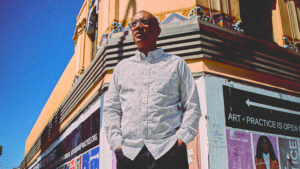
I don’t. That is the ultimate answer. There is gonna be music that springs from various cultures that has its own cultural take on what defines the values of the music. The aim of music is to connect with the listener and to bring something healing to the listener. So in that regard music is universal. The language of the music is developed without words. So people listen to it and it affects them emotionally or psychologically or [how]ever. There are different ways that various cultures have dealt with music doing that and there are differences there. But I see the ultimate goal as the same.
You did an online interview with Grant Gershon and Jenny Wong of the Los Angeles Master Chorale in June of last year where you talked about the challenges you were facing in writing music. How that situation changed for you?
I just got a barrage of commissions, which is as a great problem to have, and they just pile up like this one on the other. So you get overwhelmed and you don’t know where to begin. I’m not the kind of composer that can multi-task, like composing this thing and then composing that other thing at the same time. I have to do one thing at a time.
In 2020, you’re looking at COVID which is completely destroying the very essence of why we do music. We can’t congregate. The way we do business is the way we meet, the way we get educated, the way we worship – it’s through congregation. And so when a disease is preventing me from doing that, it’s very psychologically traumatic. So there’s that.
And then Trump was still president, which was, I’ll just put it euphemistically, very uncomfortable for me. Then the general election results denial was stressful. With the fires going on, with the racial stuff, George Flloyd and all of that stuff made it really difficult to say, “Yeah, let me write my next great symphony.”
You’ve been performing recently around Los Angeles. What does it mean to you to be back on stage with live audiences?
It means everything. When I conceive of music I’m also thinking of what impact is it having on the listener. It’s a main motivation to compose music to have it effect people. To have people there in a live situation where they can just get the direct transference of the music to their ears – that’s important. That’s why you do music.
For Thursday night’s show you’ll once again be working with Dianne Reeves. What does your collaboration with her offer you that is unique to who she is and what she brings as an artist?
I have been working with her since 1977, so we kind of know each other. We’re kind of cut from the same cloth. We’re close in age and we grew up listening to the same things and being influenced by the same things. Conceptually she really understands how I hear music. And I really get where she’s coming from, too.
I think the thing that both of us ultimately strive to do in all of our performances is to impart a dramatic experience to the listener. She does it through her voice and through her interpretation of lyrics and the visceral impact of how she’s singing. I try to do the same through composition through structure and melodic and harmonic motion. I utilize those things to try to elicit an response, you know? So that’s the ultimate goal. I also think that we like music that is ambitious and large and big and that deals with the big issues. It’s not really minimal but maximal music almost.
Is it important for you as a composer and a performer for audiences to understand what you’re saying with your music?
Yeah, I do. Otherwise, what’s the point? I mean, not so much to understand, but be moved by it and have it have an impact. I think it’s important for us to to make that impression on the audience. It’s not as important to me for the audience to understand in a technical sense what we’re doing. But it’s very important for me for them to understand what we’re trying to say and to be open to it. We’re both trying to do that.
What will you be addressing in this concert?
There’s going to be a lot of stuff that’s dealing with things of a political nature, things of a racial nature and issues that I want to address that are on my mind.
With everything that’s going on in the world, it would seemingly be irresponsible not to address these issues.
I would think so. Well, you know, some people just want to entertain – which is fine. Some people view their art as maybe an escape for people to come to, to run away from the problems of the world. But I think there can be an element of both. I think music is ultimately to heal people and sometimes you need to confront what the problem is to be healed.
For healing to take place, listeners must be engaged. In 2011, you told All About Jazz that you make the distinction between active listening and passive listening. What are your thoughts about the art of listening and whether technology is leading us down a path where passive listening is the most we can hope for?
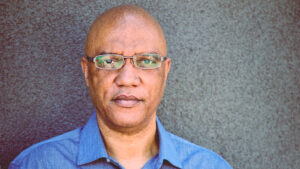
That’s a danger and that’s unfortunately what is happening. You have people who are satisfied with listening to something off of their playlist by just turning on their iPhone and listening to it through those crappy speakers, rather than someone who actually gets the vinyl and puts it on the turntable and listens to it through their hi-fi system or actually goes to a concert and listens to the whole thing and has an experience. That’s kind of what’s going on.
Then you have like pop producers who are compressing the music so that it just slams you in the face. And it’s like the same. You know there’s like about a hundred songs that are written off of the same harmonic progression in different permutations. It all sounds the same. The vocal licks sound all the same. It’s almost as though there is this concerted effort to limit people’s limit the range of expression that people can tolerate and listen to, you know?
But I fight that. My answer to that is to keep writing music that I think is important. I think people are humans underneath all of this. I think there’s an element of people when they hear the truth, they respond to it regardless of what they’ve been exposed to.
For tickets to Thursday night’s concert at The Ford, please go here.
All photos of Billy Childs by Raj Naik/Courtesy Unlimited Myles






